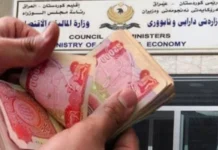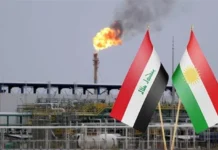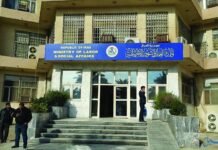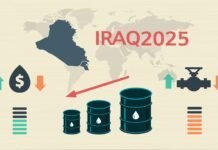TNT:
Tishwash: All public and private sector salaries will be in dinars. Central official
The Assistant Director of Foreign Transfers at the Central Bank confirmed today, Monday, that all salaries in the government and private sectors must be in Iraqi dinars, and that the country is gradually moving to restrict transactions to the national currency, with exceptions for oil companies and the like.
Dr. said. Muhammad Younis, in an interview with journalist Karim Hammadi
The decision to ban dealing in dollars is not new. At the beginning of this year, the Prime Minister obligated all departments and the private and public sectors to deal in the Iraqi dinar, but there is an exception for companies and departments that have contracts in dollars, such as oil companies and others.
All contracts between companies and employees, or between the state and citizens, and the payment of salaries, etc., in the private and public sectors, must be in dinars.
Today we emphasized to the banks that the remaining red line is if the citizen deposits money in US dollars, then he must receive his deposit in US dollars as well.
The situation has changed today. We want to spare the Central Bank and Iraqi banks from sanctions, deprivation and problems, so we must comply with international laws and norms.
I am surprised by the word “crisis.” Today, Iraq is at a level of historical reserves that exceed 100 billion dollars, and we have the fourth largest Arab gold reserve. We do not have a crisis, and the price of a barrel of oil is 90 dollars, and we export 4 million barrels per day.
The dollar exists and is available to every person or entity that uses official channels to obtain it. How do I compare myself to Lebanon? Lebanon does not have the resources that we have, and price inflation is declining, despite the exchange rate situation. link
************
CandyKisses: Famous Bank: The Middle East is in a Golden Age
Information/follow-up.
JPMorgan’s head of Europe, Viswas Raghavan, said the Middle East is enjoying a “golden age” as global tensions are pushing money and talent into the region.
Speaking in an interview with Bloomberg TV, Raghavan said there has been a jump in deal-making and capital market opportunities in many countries in the past few quarters.
He added that most of the Middle East’s oil countries are in a very good position, both to attract money managers and hedge funds, and also to their domestic economies, which have become dominant. This is a golden age for Middle Eastern and Middle Eastern companies in general. I think she’s here to stay.”
Raghavan, JPMorgan’s chief executive for Europe, the Middle East and Africa, said the global outlook for investment banking shows “some green shoots”, especially in technology, although the number of opportunities is not yet a flood. Total bank charges across the industry are expected to reach $65 billion this year, compared to a typical year of about $80 billion, he added. Finished/25hr
************
Tishwash: Parliamentary Finance will host the Minister of Finance in the coming days to discuss the delay in financing projects
Today, Monday, the Parliamentary Finance Committee revealed the outcomes of hosting the Minister of Planning and the governors, while announcing the hosting of the Minister of Finance in the coming days to discuss the delay in financing projects.
The head of the committee, Atwan Al-Atwani, said in a press statement followed by NRT Arabia, that “the committee hosted today the Minister of Planning and the governors of Basra and Nineveh as representatives of the governors, and hosted the unorganized governorates in the Kurdistan Region, and they presented their problems in financing ongoing and new projects, and it was necessary to host the Minister of Planning.” Because part of the problems concern the ministry.”
Al-Atwani explained, “During the meeting, the problems raised by the governorates yesterday, Sunday, were discussed, and some of them were agreed to proceed with, such as standard documents, auditing of projects and priorities, and financial costs that must be audited to ensure the implementation of projects.”
He added, “With regard to some observations, an agreement was reached with the Ministry of Planning regarding the coordinating body, given that the budget charted a path for approval of the plan, which is for it to be from the governorates, then to the Ministry of Planning, and then to the Ministry of Finance.”
He pointed out that “many observations were discussed, and the Minister of Planning expressed his readiness to resolve the issue of advances within 48 hours,” stressing, “not to delay it, and many of the problems raised at the governors’ meeting were addressed.”
He noted, “Parliamentary Finance will add the Minister of Finance next Thursday, or next week, to discuss the delay in financing projects whose requirements have been completed by the Ministry of Planning.”
He continued, “This matter constitutes a concern considering that the year is almost over and there are financial allocations that do not fund projects. This creates new lagging projects, which will be followed up with the Ministry of Finance.” link
Tishwash: The Governor of the Central Bank discusses with his Jordanian counterpart ways to enhance cooperation and improve banking relations between the two countries
Today, Monday, the Governor of the Central Bank, Ali Mohsen Al-Alaq, discussed with his Jordanian counterpart, Adel Al-Sharkas, in Amman, ways to enhance cooperation and improve banking and financial relations between the two countries.
They also discussed banking issues of common interest, developments in the tasks and work of central banks in the region, and developments in global monetary policies and their trends in the current stage that is witnessing inflationary pressures that have led to the continuation of tight monetary policies by many central banks in the world.
The two parties stressed, to the official “Al-Sabah” newspaper, “the necessity and importance of joint cooperation in the financial and banking sector, in a way that serves the trend towards expanding the horizons of economic cooperation between Iraq and Jordan.”
The terms of the agreement focused on expanding cooperation mechanisms and exchanging information and expertise in many fields, such as supervision and control of… Electronic payment systems and services, modern financial technology, innovation, cybersecurity, combating money laundering and terrorist financing, and emphasizing the exchange of skills and training of employees of both parties, in addition to existing cooperation at the level of banking and banking supervision. link
**************
Tishwash: Discussions between Iraq and Russia regarding the memorandum of understanding to be concluded in the field of combating corruption
The head of the Federal Integrity Commission, Judge Haider Hanoun, received on Monday the Assistant to the Russian President, Igor Levitin. To finalize the memorandum of understanding to be concluded between the Federal Integrity Commission and the Public Prosecution Office concerned with combating corruption in the Russian Federation.
The judge confirmed, during his meeting at the Commission’s headquarters (Igor Levitin), Assistant to the Russian President, and the Russian Ambassador to Iraq, Elbrus Kutrashev, and their accompanying delegation
According to a statement received by Earth News, that “concluding the memorandum of understanding with the Russian Federation comes within the field of the Commission’s interaction with the government program in the field of combating Corruption, preventing its spread, and recovering wanted persons and looted funds from outside Iraq,” pointing to “the obstacles and difficulties facing the Iraqi regulatory agencies in the field of recovering defendants of other nationalities that can be overcome by concluding bilateral memorandums of understanding with counterpart agencies in those countries.”
For his part, (Igor Levitin) expressed “his country’s readiness to cooperate with Iraq in confronting corruption, prosecuting its perpetrators, returning wanted persons and looted funds to Iraq, exchanging experiences and providing legal assistance,” indicating that “oversight work – especially the work of the Federal Integrity Commission – is difficult and requires support.” Pointing out that “the nature of oversight work makes the corrupt harbor hostility toward these agencies and try to obstruct their work.”
The two parties agreed to “extend the bonds of cooperation, joint coordination, exchange experiences, learn about the Russian experience in the field of preventing and combating corruption, and expedite the conclusion of the aforementioned memorandum of understanding.” link





